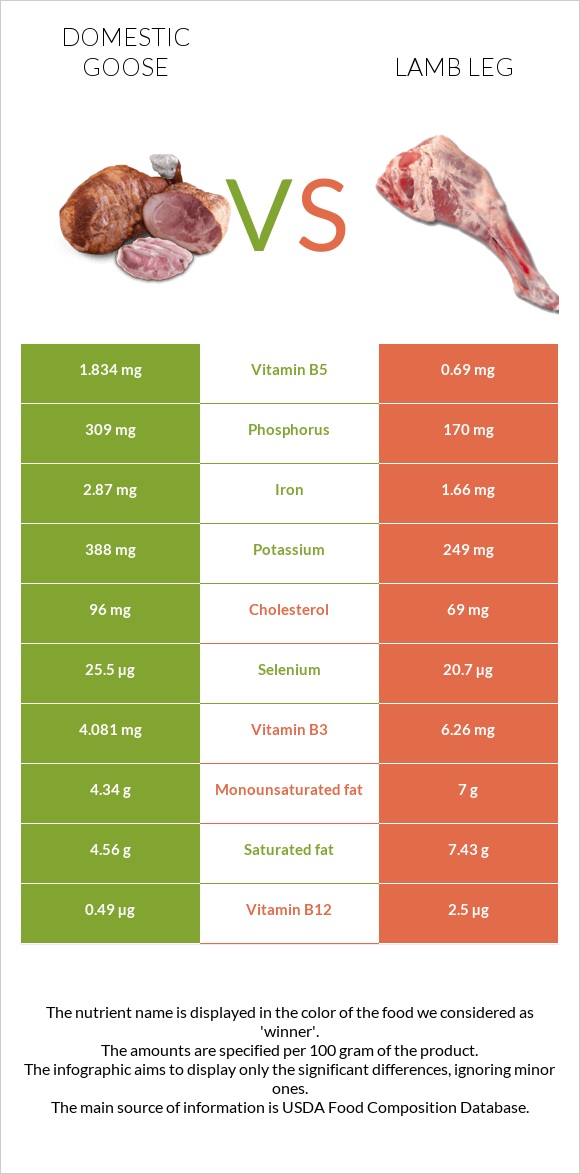Domestic goose vs. Lamb leg — In-Depth Nutrition Comparison
Compare
Significant differences between domestic goose and lamb leg
- Domestic goose has more vitamin B6, vitamin B5, phosphorus, copper, iron, and vitamin B2; however, lamb leg is richer in vitamin B12 and vitamin B3.
- Lamb leg covers your daily vitamin B12 needs 84% more than domestic goose.
- Lamb leg has 3 times less vitamin B6 than domestic goose. Domestic goose has 0.47mg of vitamin B6, while lamb leg has 0.15mg.
- Lamb leg contains less cholesterol.
Specific food types used in this comparison are Goose, domesticated, meat only, cooked, roasted and Lamb, domestic, leg, whole (shank and sirloin), separable lean, and fat, trimmed to 1/4" fat, choice, raw.
Infographic

Infographic link
Mineral Comparison
Mineral comparison score is based on the number of minerals by which one or the other food is richer. The "coverage" charts below show how much of the daily needs can be covered by 300 grams of the food.
| Contains more CalciumCalcium | +55.6% |
| Contains more PotassiumPotassium | +55.8% |
| Contains more IronIron | +72.9% |
| Contains more CopperCopper | +144.2% |
| Contains more PhosphorusPhosphorus | +81.8% |
| Contains more ManganeseManganese | +20% |
| Contains more SeleniumSelenium | +23.2% |
| Contains less SodiumSodium | -26.3% |
Vitamin Comparison
Vitamin comparison score is based on the number of vitamins by which one or the other food is richer. The "coverage" charts below show how much of the daily needs can be covered by 300 grams of the food.
| Contains more Vitamin AVitamin A | +∞% |
| Contains more Vitamin B2Vitamin B2 | +69.6% |
| Contains more Vitamin B5Vitamin B5 | +165.8% |
| Contains more Vitamin B6Vitamin B6 | +213.3% |
| Contains more Vitamin B1Vitamin B1 | +41.3% |
| Contains more Vitamin B3Vitamin B3 | +53.4% |
| Contains more Vitamin B12Vitamin B12 | +410.2% |
| Contains more FolateFolate | +58.3% |
All nutrients comparison - raw data values
| Nutrient |  |
 |
DV% diff. |
| Vitamin B12 | 0.49µg | 2.5µg | 84% |
| Vitamin B6 | 0.47mg | 0.15mg | 25% |
| Vitamin B5 | 1.834mg | 0.69mg | 23% |
| Protein | 28.97g | 17.91g | 22% |
| Phosphorus | 309mg | 170mg | 20% |
| Copper | 0.276mg | 0.113mg | 18% |
| Iron | 2.87mg | 1.66mg | 15% |
| Vitamin B3 | 4.081mg | 6.26mg | 14% |
| Saturated fat | 4.56g | 7.43g | 13% |
| Vitamin B2 | 0.39mg | 0.23mg | 12% |
| Cholesterol | 96mg | 69mg | 9% |
| Selenium | 25.5µg | 20.7µg | 9% |
| Fats | 12.67g | 17.07g | 7% |
| Monounsaturated fat | 4.34g | 7g | 7% |
| Potassium | 388mg | 249mg | 4% |
| Vitamin B1 | 0.092mg | 0.13mg | 3% |
| Folate | 12µg | 19µg | 2% |
| Calcium | 14mg | 9mg | 1% |
| Zinc | 3.17mg | 3.32mg | 1% |
| Sodium | 76mg | 56mg | 1% |
| Vitamin A | 12µg | 0µg | 1% |
| Vitamin E | 0.21mg | 1% | |
| Polyunsaturated fat | 1.54g | 1.35g | 1% |
| Calories | 238kcal | 230kcal | 0% |
| Magnesium | 25mg | 23mg | 0% |
| Manganese | 0.024mg | 0.02mg | 0% |
| Tryptophan | 0.403mg | 0.209mg | 0% |
| Threonine | 1.238mg | 0.767mg | 0% |
| Isoleucine | 1.488mg | 0.864mg | 0% |
| Leucine | 2.447mg | 1.393mg | 0% |
| Lysine | 2.48mg | 1.582mg | 0% |
| Methionine | 0.783mg | 0.46mg | 0% |
| Phenylalanine | 1.214mg | 0.729mg | 0% |
| Valine | 1.516mg | 0.967mg | 0% |
| Histidine | 0.765mg | 0.567mg | 0% |
Macronutrient Comparison
Macronutrient breakdown side-by-side comparison
Protein:
28.97 g
Fats:
12.67 g
Carbs:
0 g
Water:
57.23 g
Other:
1.13 g
Protein:
17.91 g
Fats:
17.07 g
Carbs:
0 g
Water:
64.32 g
Other:
0.7 g
| Contains more ProteinProtein | +61.8% |
| Contains more OtherOther | +61.4% |
| Contains more FatsFats | +34.7% |
| Contains more WaterWater | +12.4% |
~equal in
Carbs
~0g
Fat Type Comparison
Fat type breakdown side-by-side comparison
Saturated fat:
Sat. Fat
4.56 g
Monounsaturated fat:
Mono. Fat
4.34 g
Polyunsaturated fat:
Poly. Fat
1.54 g
Saturated fat:
Sat. Fat
7.43 g
Monounsaturated fat:
Mono. Fat
7 g
Polyunsaturated fat:
Poly. Fat
1.35 g
| Contains less Sat. FatSaturated fat | -38.6% |
| Contains more Poly. FatPolyunsaturated fat | +14.1% |
| Contains more Mono. FatMonounsaturated fat | +61.3% |





